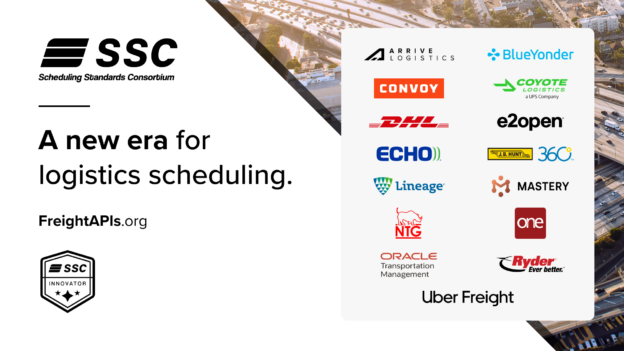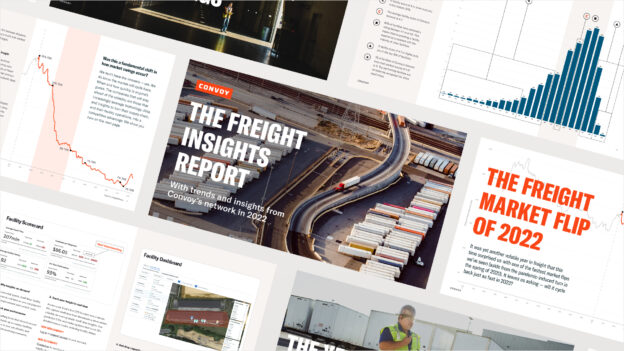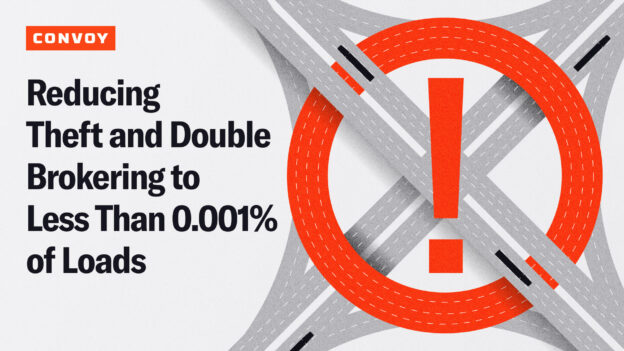Supply chain consulting from a digital freight network
Data Science, Industry Insights, Shippers • Published on June 11, 2020
Shippers sometimes worry that the use of technology in a digital freight network (DFN) takes the place of customer service with a human touch. In fact, shippers who work with Convoy have found the opposite to be true: by automating many of the mechanical, repetitive tasks across the shipment lifecycle, the team at Convoy can allocate more time and energy to solving shippers’ more strategic transportation challenges, partnering with them as a supply chain consultant.
This proved to be the case when Anheuser-Busch awarded Convoy its Non-Asset Carrier of the Year Award, a recognition typically bestowed upon traditional freight brokers. Today, Convoy is one of Anheuser-Busch’s largest over-the-road carriers.
While Convoy’s technology platform and data provide a strong foundation that equips us to make better decisions, it’s the level of service, outstanding performance, and the tailored programs that has earned Convoy a deep level of trust that has taken our partnership far beyond a tech platform.”
Anheuser-Busch InBev’s VP of Sustainability and Logistics Procurement
Why would more technology lead to higher levels of customer service? Let’s look back at history for an example of how technology automation helps us spend less time on transactions and more time on higher-level consulting.
How a DFN is like an ATM
Consider the impact of the automated teller machine (ATM) on the banking industry. When ATMs were introduced in the 1970s, people worried that this would lead to massive unemployment for bank employees. Instead of going to a human teller, a customer would use a debit card at an ATM to withdraw and deposit cash.
Surprisingly, the opposite happened. As ATM use exploded, the full-time equivalent workers at bank branches grew steadily. Economist James Bessen covers this in his book Learning by Doing: The Real Connection between Innovation, Wages, and Wealth.
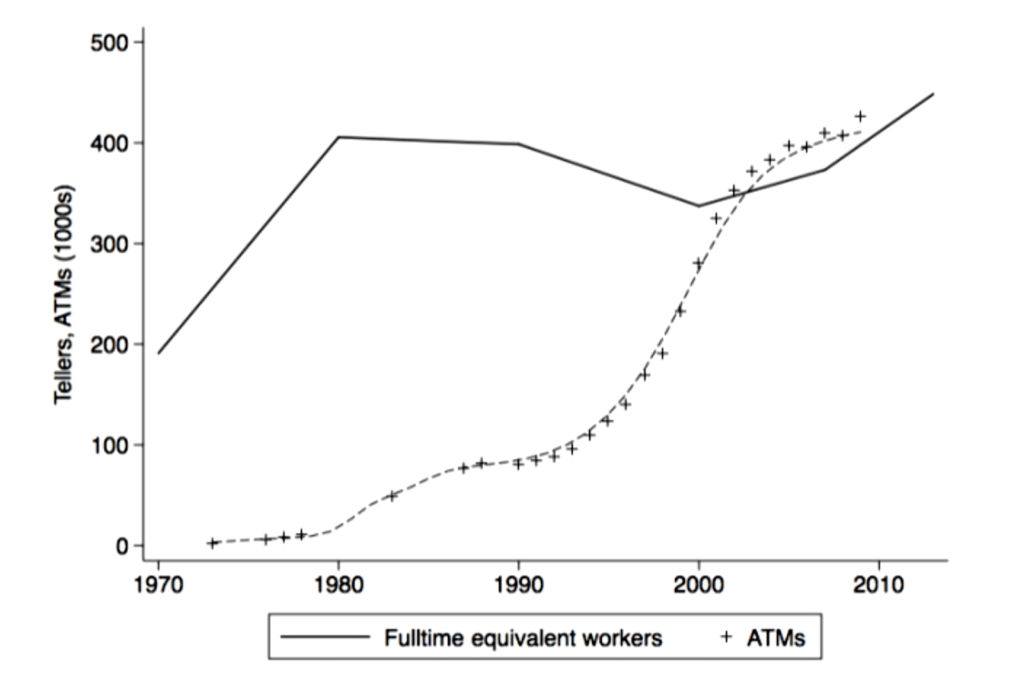
ATMs didn’t eliminate the need for tellers. They changed the way tellers work. Today, tellers spend less time on simple money-counting transactions well-suited for machines, and more time on complex customer support issues best-suited for people. Meanwhile, bank branches expanded the role of financial advisors, loan officers, and business banking specialists. In this case, automated technology didn’t remove the human connection, it deepened it.
Our digital freight network follows the same model. We use machine learning technology to automate the freight transportation process, including tendering, matching, and hauling. A traditional broker or asset-based carrier may take hours to coordinate a truck with a load. Our platform can achieve this in minutes instead of hours without a single phone call or email.
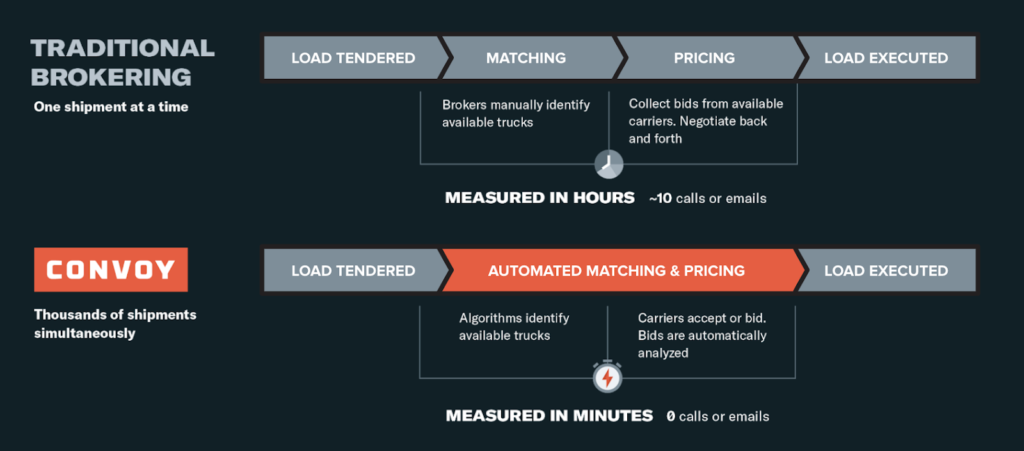
We spend less time on the operational tasks suited for technology, and more time on higher-value strategic questions better suited for people. Time that was once spent emailing, calling, collecting bids, and negotiating rates is now focused on analyzing your lane network, evaluating facility performance, and planning capacity for your shifting needs. This helps lower transportation costs for shippers, reducing incidentals and wait times, while providing reliable and flexible carrier capacity.
Just as ATMs changed the role of a banking branch, a DFN is changing the role of a truckload freight partner from being transaction-oriented to people-oriented.
Supply chain consulting with account management and data science
In addition to automating the freight matching process, our digital freight network collects thousands of data points on each shipment we complete. We’ve invested in building a world-class account management team, with account managers who have deep experience and industry-specific knowledge across verticals. We’ve also assembled a data science team with PhD-level experts who are dedicated to solving supply chain challenges through network insights.
We provide every shipper in our network with automatically generated reports. These highlight trends and anomalies that may warrant further investigation. We also provide an online reporting dashboard that gives shippers flexibility to customize and visualize your data based on specific timeframes, geographies, shipment types, and more.
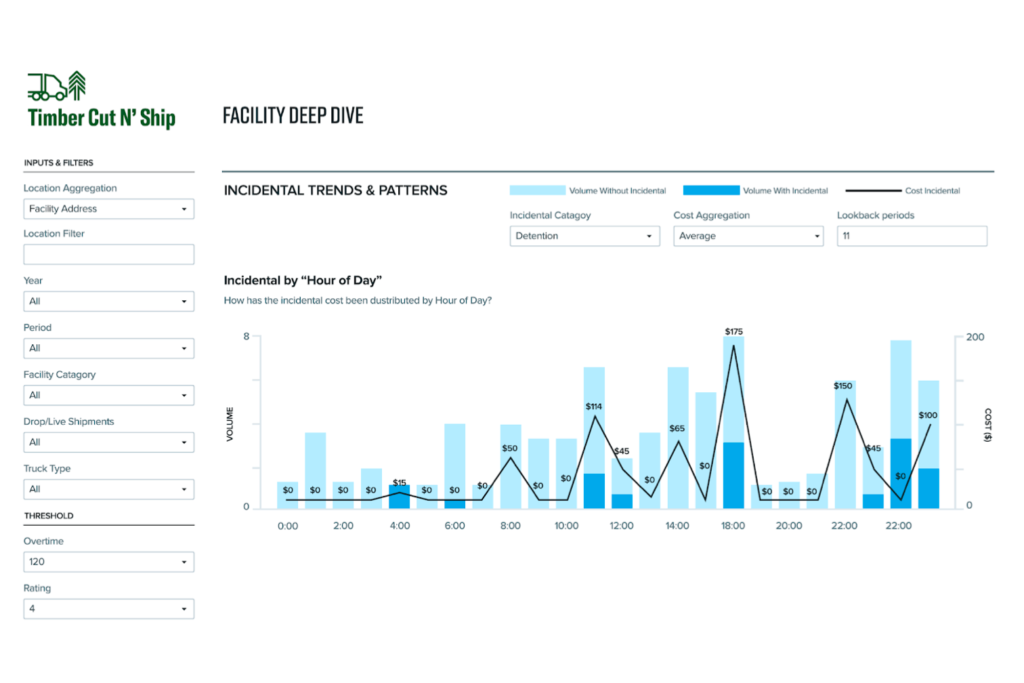
Beyond automated reports and online tools, our account management and data science teams provide custom insights and solve supply chain challenges through collaboration. Together, we’ve worked with shippers in every industry to improve their supply chain efficiency, reduce costs, and improve their customer service.
Supply chain visibility on a massive scale
Convoy’s digital freight network provides the most comprehensive data set in the industry. We leverage our comprehensive data on nationwide lanes, locations, and drivers, and combine this with institutional knowledge and familiarity with the unique needs of our shippers to provide meaningful, actionable insights.
If you’re interested in exploring how Convoy’s network insights and supply chain consulting could benefit your business, we’d love to make an introduction. In as few as 100 loads, we can examine patterns in your shipments and identify potential areas to improve your transportation efficiency.
More resources on how digital freight networks can support supply chain visibility and consulting:
- Download our white paper: Supply Chain Visibility and the Digital Freight Network.
- Whether you’re selecting a freight partner or starting a freight RFP process, consult our guide to developing a freight transportation strategy.
- Discover three ways supply chain visibility can improve facility performance.
